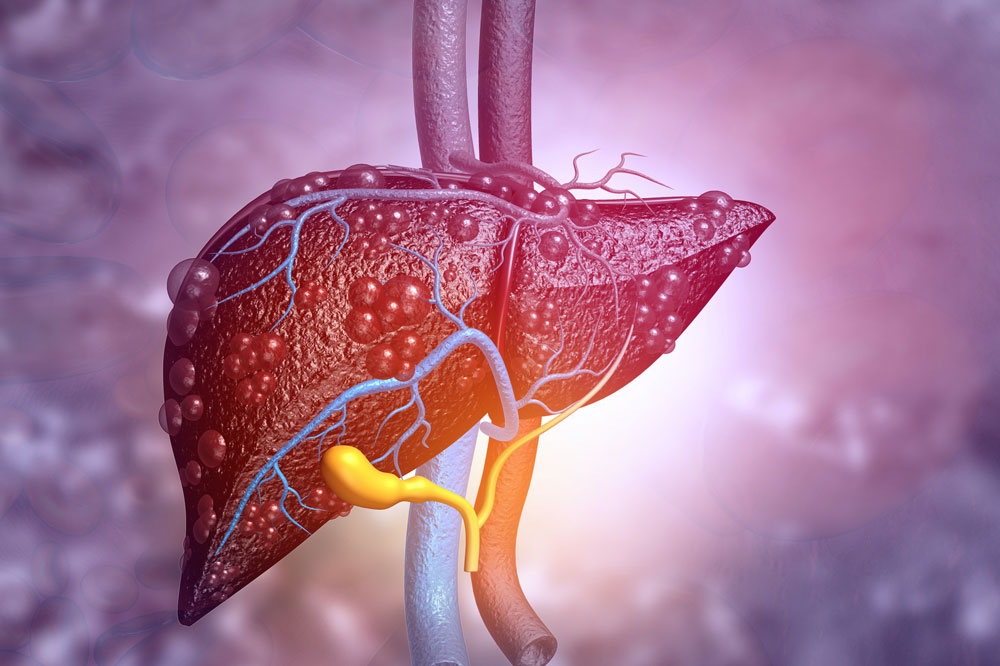What Is Liver Cirrhosis?
Liver cirrhosis is a serious medical condition that affects the liver, causing it to become scarred and dysfunctional. The liver filters toxins from the blood, produces essential proteins, and stores energy. When scar tissue replaces healthy liver tissue this disrupts the liver’s ability to function properly leading to various complications that can be life-threatening.
What Causes Liver Cirrhosis?
The leading causes of liver cirrhosis are chronic alcohol consumption, chronic viral hepatitis (particularly hepatitis B and C) and fatty liver disease. Other causes include autoimmune conditions, genetic disorders, and certain medications or toxins. Long-term exposure to these factors can damage liver cells and lead to the development of cirrhosis.
What Are the Symptoms of Liver Cirrhosis?
In the early stages, liver cirrhosis may not cause noticeable symptoms. As cirrhosis progresses, the following symptoms may occur:
- Fatigue and Weakness – People with cirrhosis often feel tired and weak, even after minimal physical exertion. This is because the damaged liver struggles to store and release energy efficiently.
- Jaundice – Jaundice is a common symptom of liver dysfunction. It causes yellowing of the skin and the whites of the eyes due to the buildup of bilirubin, a yellow pigment, in the body.
- Abdominal Pain and Discomfort – Cirrhosis can lead to accumulation of fluid in the abdomen, causing swelling and discomfort.
- Easy Bruising and Bleeding – As the liver’s ability to produce clotting factors is affected, individuals with cirrhosis may bruise easily and experience frequent nosebleeds or gum bleedings.
- Swelling in Legs and Ankles – The liver’s impaired function can result in fluid retention, leading to swelling in the legs, ankles, and feet.
- Itching – A buildup of bile salts in the bloodstream can cause intense itching of the skin.
- Spider-Like Blood Vessels – Spider angiomas, small red blood vessels resembling spider webs, may appear on the skin, especially the upper body.
- Changes in Mental Alertness – In advanced cases, cirrhosis can cause hepatic encephalopathy, resulting in confusion, forgetfulness, difficulty concentrating, and altered consciousness.
How Is Liver Cirrhosis Diagnosed?
To diagnose liver cirrhosis, doctors may perform a physical examination, review medical history, and conduct blood tests to assess liver function. Imaging tests like ultrasound, CT scans, or MRI may be used to visualise the liver’s condition. In some cases, a liver biopsy might be necessary to confirm the diagnosis by examining a small sample of liver tissue.
What Are the Complications of Liver Cirrhosis?
Liver cirrhosis can lead to several serious complications, some of which can be life-threatening. These complications arise due to progressive scarring and damage to the liver, which impairs its ability to perform essential functions. Some of the common complications of liver cirrhosis include:
- Portal Hypertension – The scarring in the liver can obstruct blood flow through the organ, leading to increased pressure in the portal vein, a large blood vessel that carries blood from the digestive organs to the liver. This condition is known as portal hypertension. The elevated pressure can cause engorgement of veins in the digestive system, leading to bleeding, especially in the oesophagus and stomach.
- Oesophageal Varices – Portal hypertension can cause the development of enlarged and fragile blood vessels (varices) in the walls of the oesophagus and stomach. These varices are at risk of rupturing, leading to severe and potentially life-threatening bleeding.
- Ascites – As liver function declines, fluid may accumulate in the abdominal cavity, causing ascites. This fluid buildup results from increased pressure in the blood vessels and impaired liver function to remove excess fluid from the body. Ascites can lead to abdominal swelling, discomfort, and difficulty breathing.
- Hepatic Encephalopathy – The liver plays a crucial role in removing toxins from the blood, including ammonia, which is a waste product of protein metabolism. When the liver is damaged, ammonia can accumulate in the bloodstream and affect the brain, leading to hepatic encephalopathy. This can cause confusion, personality changes, forgetfulness, and, in severe cases, coma.
- Hepatorenal Syndrome (HRS) – HRS is a serious complication of liver cirrhosis in which kidney function deteriorates due to severe liver damage and portal hypertension resulting in kidney failure.
- Increased Risk of Infections – A damaged liver is less effective at fighting off infections, making individuals with cirrhosis more susceptible to bacterial, viral, and fungal infections.
- Liver Cancer (Hepatocellular Carcinoma) – Long-standing cirrhosis increases the risk of developing liver cancer particularly in individuals with cirrhosis caused by chronic viral hepatitis.
- Malnutrition and Weight Loss – As liver cirrhosis progresses, the liver’s ability to process and store nutrients is compromised, leading to malnutrition and unintended weight loss.
Can Liver Cirrhosis Be Prevented?
Liver cirrhosis can often be prevented or delayed by adopting a healthy lifestyle. Limiting alcohol intake, avoiding risky behaviours that can lead to viral hepatitis, maintaining a balanced diet, and staying physically active can help protect the liver from damage.
What Are the Medications for Liver Cirrhosis?
Although there is no cure for liver cirrhosis, medications can help manage its symptoms and slow its progression. Doctors may prescribe drugs to alleviate symptoms, reduce inflammation, prevent complications, and promote better liver function.
What Are the Tips and Precautions if Living with Liver Cirrhosis?
Living with liver cirrhosis requires careful management and lifestyle adjustments. Following the prescribed treatment plan, taking medications as directed, and attending regular check-ups is crucial. Adopting a healthy diet, avoiding alcohol and substances harmful to the liver, and staying vigilant for any signs of complications can significantly improve the individual’s well-being and long-term prognosis.





